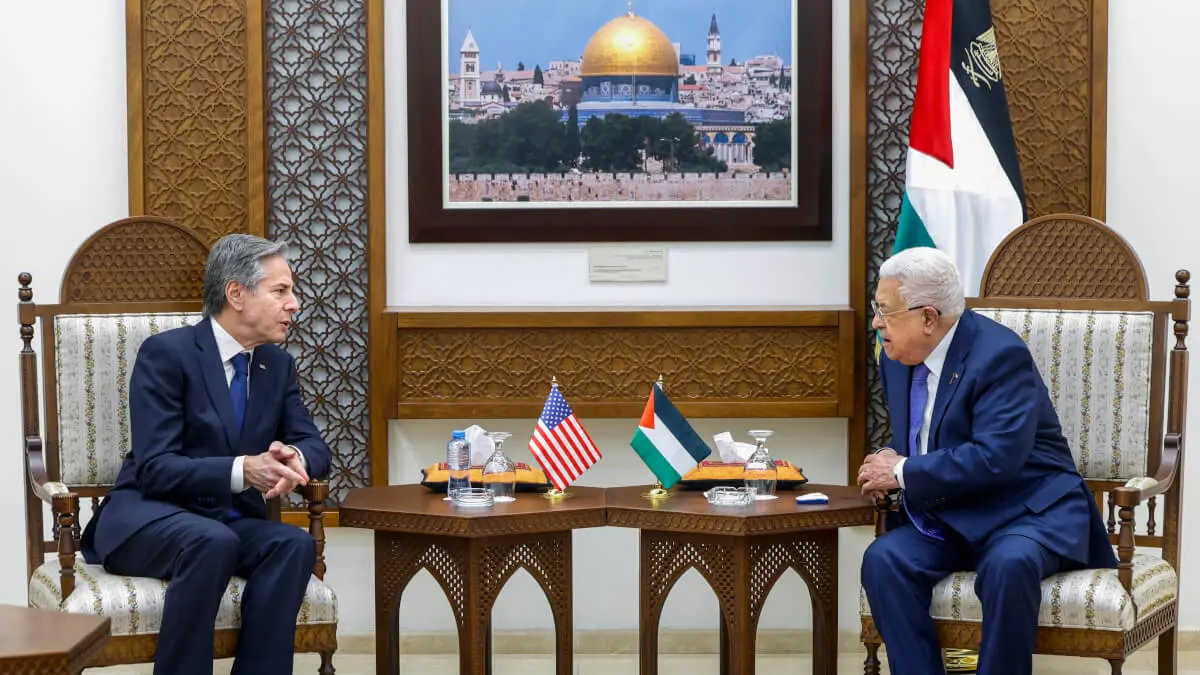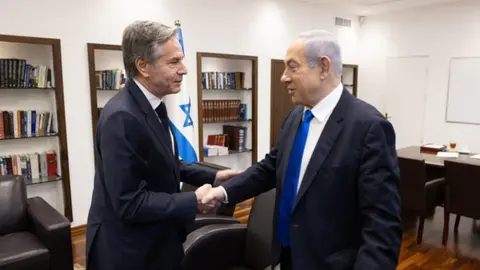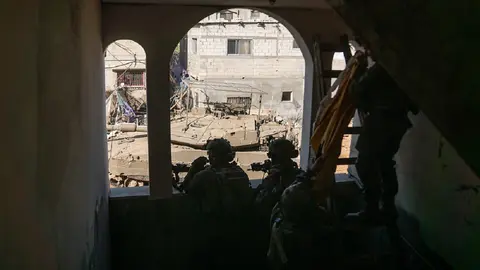Blinken calls for PA reforms with an eye on Gaza's future

As the conflict in Gaza rages on, the US is already beginning to map out a plan for the day after the war. Joe Biden's administration, an advocate of the two-state solution, hopes that countries in the region - especially the most powerful and influential ones - will become involved in the reconstruction of the Palestinian enclave, as well as in moving forward on the political track.
Of course, all these post-war plans do not include Hamas, the group that has ruled the Gaza Strip since its victory in the 2006 elections, the last elections held in the enclave. Instead of the Islamist organisation responsible for the worst attack on Israel in its history, Washington expects the Palestinian Authority - which currently administers parts of the West Bank - to take control of Gaza once the war is over.
However, before this happens and the Palestinian Authority takes the reins in Gaza, Palestinian leader Mahmoud Abbas must take action and push for governance reforms. This was precisely the request of Secretary of State Antony Blinken during his meeting with Abbas in Ramallah.
Blinken meets President Abbas in Ramallah to discuss #Gaza & situation in occupied West Bank - some protests against his visit pic.twitter.com/IPbyqh6Rih
— sebastian usher (@sebusher) January 10, 2024
The US diplomat said during his press conference in Tel Aviv that the Palestinian Authority "has a responsibility to reform itself and improve its governance". Blinken promised to raise this issue with Abbas during their meeting, as the US hopes to see a "renewed and revitalised" Palestinian Authority in order to take charge of Gaza.
Support for Hamas grows in West Bank
The Palestinian leader, also known as Abu Mazen, has not held elections since 2005, when he took power after winning the elections with 60 per cent of the vote. Elections were due to be held in 2021 after 15 years, but Abbas postponed them, according to Palestinian officials, until Israel allows East Jerusalem residents to vote.
Indeed, in the territories governed by Fatah - Hamas's political opponent - the popularity of the terrorist group has increased in recent years, and Palestinian leaders in Ramallah are aware of this.
In Ramallah, Palestinians demonstrated against US Secretary of State Antony Blinken's visit to the city, where he's scheduled to meet with President Mahmoud Abbas. pic.twitter.com/MbLfRDvGap
— Khaled Abu Toameh (@KhaledAbuToameh) January 10, 2024
A poll conducted by the Palestinian Center for Survey and Policy Research and published last December shows an increase in support for Hamas in the West Bank, support that appears to have grown despite the brutal 7 October attack and subsequent war.
Protests engulf the occupied West Bank and refugee camps in Lebanon in response to an Israeli strike in Beirut that killed senior Hamas official, Saleh al-Arouri. pic.twitter.com/aB5Mo2ttRh
— Middle East Eye (@MiddleEastEye) January 2, 2024
Despite the devastation in Gaza, 57% of Gazan respondents and 82% in the West Bank believe that Hamas did the right thing in launching the attack on Israel. In this regard, only 10% believe that Hamas committed war crimes against civilians, while a large majority said they had not seen videos showing the atrocities.
On the other hand, the data also reveals a strong dislike of Abbas. Ninety per cent of respondents believe that he should resign and step down from leading an administration that has been described as corrupt and ineffective.
Ramallah |
— Younis Tirawi | يونس (@ytirawi) December 31, 2023
“The West Bank needs Marwan Bargouthi and Saleh Arouri”
Hundreds of residents gather at Manarah square in solidarity with Gaza
Notably, chants were made for the 2 leaders from Ramallah, Marwan Bargouthi (in IOF prisons for 20y) & Saleh Arouri (deputy head of Hamas) pic.twitter.com/Mp6sni0UTz
Blinken calls on Israel to work with "moderate" Palestinians
The secretary of state, in addition to urging Abbas to reform the Palestinian Authority, has called on Israel to work with moderate Palestinians and regional countries on plans for the future of Gaza. "Israel must stop taking actions that undermine the Palestinians' ability to govern themselves effectively," Blinken told a press conference following a meeting with Israeli leaders, according to the Associated Press.
In Tel Aviv today, I met with Israeli Prime Minister Netanyahu, President Herzog, and several other senior government officials about their military campaign in Gaza and how we see the future of the region and Israel’s future. pic.twitter.com/MQDROGKtpu
— Secretary Antony Blinken (@SecBlinken) January 9, 2024
The secretary of state encouraged Israelis to partner with Palestinian leaders seeking peace, noting that settler violence in the West Bank, as well as settlements, make lasting peace and security difficult to achieve.
With regard to neighbouring countries, Blinken said that Saudi Arabia, Jordan, Qatar, the United Arab Emirates and Turkey have pledged to begin planning for the reconstruction and governance of Gaza once the war is over. In order to address this issue, the leaders of Jordan, Egypt and the Palestinian Authority will soon meet in the Jordanian city of Aqaba.











